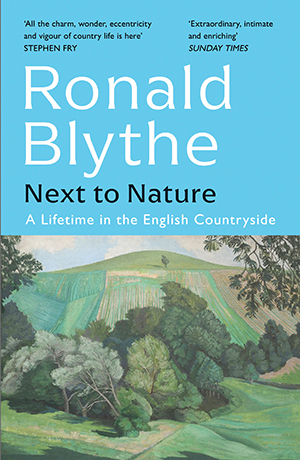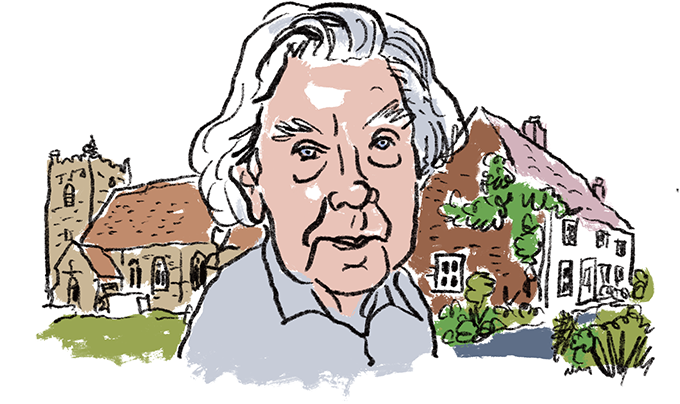Review: Next to Nature, Ronald Blythe, John Murray
Ronald Blythe died earlier this year, after turning 100. He was a fine writer, in particular a chronicler of life in his patch of Suffolk farmland, north-east of London, writing a weekly column for the UK’s Church Times from the old house he inherited from the artists John and Christine Nash. No more than a couple pages each, these little pieces are perfect miniatures of rural life, of walks, flower shows, heatwaves and downpours, and like his garden (by the sounds of it), crammed. These columns were collected in annual books, and this book is, in turn, a collection of some of those pieces, and an obituary of sorts.

The book is entitled Next to Nature, but it is fairer to say Blythe is immersed in it, inseparable from it. He writes that the ‘writer’s task is to make the ordinariness extraordinary’. His writing is a sustained act of close noticing, of delighting in what surrounds him. He mentions David Hockney making art out of the mundane, and Blythe does the same. Even night-walking he is attentive, both eyes and mind adjusted to the dark. He notices the sparkle of stars and flowers and puddles in ditches, and he frames them with his memories of festivals and local idiosyncrasies of naming and custom. The present is compared to the past envisaged by writers and painters – the London of Coleridge, the laneways of ghost story writer M R James, his local countryside as painted by Constable. Sometimes in his mind he hears all the comings and goings of a farm busy with people, long pushed aside by highly mechanised agriculture.
He writes that we need to resist romanticising the countryside – it’s interesting enough as it is, without the rose-coloured glasses. He is tolerant of weeds and writes that ‘Nature adores a muddle’, in the middle of relating how he tidies his watercourse, an activity of which, he says, tongue-in-cheek, he is ‘ashamed’. Even with wind like a ‘scythe’, he writes that the weather is too good to be indoors. Alexandra Harris, chronicler of English weather, notes in her introduction to one of the book’s sections his appreciation for any weather.
Being polished diary entries, the selections are taut. They often begin with truncated sentences that have the feel of poetry: ‘Raw spring days.’ ‘A John Constable morning. Cumulus clouds heap up on each other…’ Harris writes that Blythe appreciates simplicity, but there is a sophistication of language to precisely focus on experience. There is also a twinkle in the eye. He is amused at the follies of modernity. He dignifies cleaning as ‘the art of Dyson’.
Nature is only part of the story. Stephen Fry’s endorsement adorns the book cover, but one wonders what this cultured despiser would make of Blythe’s faith. Perhaps he puts it down to what he calls ‘eccentricity’. Blythe’s friend Richard Mabey (to his credit) admits in his introduction to the book that he once made a comment about the church’s contemporary irrelevance and Blythe quietly told Mabey he didn’t know what he was talking about. Blythe knows the country parish as a place where the seasons of the church turn with the seasons of the fields. The church is a place to give thanks for the world, a place where blessing falls on the disparate characters who fumble through prayer and liturgy and come together for support. And the church connects the generations. He is positive: the liturgical traditions are important to him, sour debates that sometimes preoccupy the church aren’t.
Mabey was a part, as Blythe says, of Blythe’s literary life, but the church is part of his local life, though in his writing the literary and liturgical are all tangled up with his nature writing. The pruning of his bay tree leads him to write about Virginia Woolf’s holidays, then the Desert Fathers. Whatever is happening in the garden reminds him of phrases from the Bible. He describes a thunderstorm as the ‘hosts of Midian prowling’. Why don’t we read Scripture for pleasure? he asks. He thinks God will ask, why didn’t you enjoy the world more?
While Fry might see nature red in tooth and claw as pointing to an absence of deity, Blythe sees the sparkle of frost and dew as reflecting a heavenly light. He concurs with the rural poet John Clare, whom he wrote about extensively, who said, ‘Nature, thou truth from Heaven’. Blythe says at one point that he detests the term ‘churchgoers’ – he doesn’t explain why but perhaps he doesn’t like the demarcation. He quotes 2 Samuel, where God says he doesn’t need a temple, and perhaps for Blythe the church is a place to be reminded of God’s omnipresence.
Inevitably, there is some repetition of themes, which messes with the chronology. He writes about the church being emptied out of the harvest thanksgiving decorations, then only a few pages later we are reading about a full church again (from a different year). Such is the result of compilation but, as Blythe might say, never mind – like a favourite movie, we are happy to see it again. As a compilation, we are perhaps meant to read the entries intermittently, in small bites, even as they originally appeared, weekly. But besides the fact that I had to read them quickly to write this review, they are a feast, and I couldn’t help but gulp them down, page after page.
Nick Mattiske blogs on books at coburgreviewofbooks.wordpress.com and is the illustrator of Thoughts That Feel So Big.












